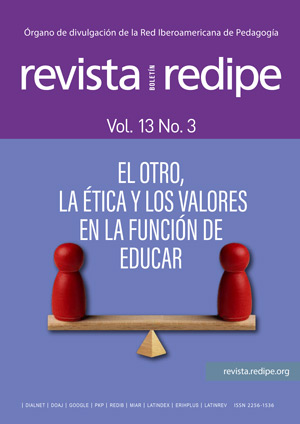Los estándares de ciencias naturales en el aula. Una reflexión desde el concepto evolución biológica
##plugins.themes.bootstrap3.article.main##
Keywords
CTS, Evolución biológica, Estándares, Reflexión pedagógica
Resumen
Este artículo tiene como objetivo reflexionar sobre la implementación en el aula del concepto Evolución Biológica y los estándares de Ciencias Naturales en la asignatura de Biología de grado 11 en la IEO Jorge Isaacs INEM de Cali. A través de un estudio de caso que involucra a un profesor en ejercicio, se recopilaron datos, notas y comentarios para interpretar y reflexionar sobre la dinámica de su trabajo, desde la perspectiva del observador. También, se analizaron los pasos necesarios para que los estudiantes alcancen el estándar. La reflexión pedagógica, que se posiciona como una prioridad para cada profesor en las instituciones educativas, se manifiesta en la constante búsqueda de métodos que acerquen a los estudiantes, reconociendo su importancia para el mejoramiento continuo, dando forma a propuestas educativas con un carácter innovador. Los resultados ofrecen una visión detallada del trabajo en el aula, contribuyendo significativamente a la comprensión de cómo el enfoque en Ciencia, Tecnología y Sociedad puede implementarse de manera efectiva para elevar la calidad de la enseñanza. En conclusión, se destaca la importancia crucial de la adaptabilidad y la innovación por parte de los educadores. Profesionales que desempeñan un papel fundamental en la formación de los estudiantes, no solo proporcionando conocimientos biológicos, sino también cultivando habilidades de pensamiento crítico, fomentando la participación en el proceso educativo.
Referencias
Araujo, & Ramírez. (2014). Obstáculos al aprendizaje del concepto estructurante evolución biológica. Bio-grafía, 231– 244. https://doi.org/10.17227/20271034. vol.0num.0bio-grafia231.244
Constitución Política de Colombia, 2 (1991). https://www.funcionpublica.gov.co/ eva/gestornormativo/norma_pdf. php?i=4125
Astudillo, C., Rivarosa, A., & Adúriz-Bravo, A. (2018). Evolución biológica y reflexión metacientífica. Aportes para la formación docente del profesorado de ciencias. TED, 43, 91–116. https:// revistas.pedagogica.edu.co/index.php/ TED/article/view/8653/6522
Callejas, Hernández, & Pinzón. (2011). Objetos de aprendizaje un estado del arte. 2011, 7(1), 176–189.
Candela, A. (1999). Ciencia en el aula. Los alumnos entre la argumentación y el consenso. (Primera edición). www. paidos.com
Colombia aprende. (2015). ¿Qué impacto tuvo la evolución del pulgar oponible sobre el desarrollo de la civilización? (pp. 1–35).
Ley General de Educación, Ley 115 1 (1994).
Curtis, H., Barnes, N., Schnek, A., & Massarini, A. (2008). Biología. (7th ed.). Médica Panamericana.
Darwin. (1921). El origen de las especies por medio de la Selección Natural.: Vol. I.
García, E., Cabrera, H., Marín, M., Salazar, T., Espinosa, A., & Alvarado, L. (2017). Prácticas experimentales en textos universitarios. Implicaciones en la enseñanza de las Ciencias Naturales. Universidad del Valle.
Grilli, J., Laxague, M., & Barboza, L. (2015). Dibujo, fotografía y Biología. Construir ciencia con y a partir de la imagen. Revista Eureka Sobre Enseñanza y Divulgación de Las Ciencias., 12(1), 91–108. https://doi.org/10.25267/rev_ eureka_ensen_divulg_cienc.2015.v12. i1.07
Hernández Sampieri, Roberto., Fernández Collado, Carlos., & Baptista Lucio, Pilar. (2014). Metodología de la Investigación. (6th ed.). McGRAW-HILL.
Koehler., & Mishra. (2007). What is technological pedagogical content knowledge (TPCK)? In Handbook of Technological Pedagogical Content Knowledge (TPCK) for Educators (pp. 3–28).
Koehler., Mishra., & Cain. (2015). ¿Qué son los Saberes Tecnológicos y Pedagógicos del Contenido (TPACK)? What Is Technological Pedagogical Content Knowledge (TPACK)? Virtualidad, Educación y Ciencia, 10, 9–22. http:// revistas.unc.edu.ar/index.php/vesc
MEN. (1998). Lineamientos curriculares Ciencias Naturales y Educación Ambiental. https://www.mineducacion.gov.co/1621/ articles-89869_archivo_pdf5.pdf
MEN. (2004). Estándares Básicos de Competencias en Ciencias Naturales y Ciencias Sociales.
Decreto 1290, Pub. L. No. 1290, 1 (2009). https://www.mineducacion.gov. co/1621/articles-187765_archivo_pdf_ decreto_1290.pdf
MEN. (2015). Derechos Básicos de Aprendizaje. (Ciencias Naturales.).
Muñoz, F., Valencia, E., & Giovany CabreraCastillo, H. (2017). Situaciones Científicas Escolares Problematizadoras a partir del análisis del Experimento V de Robert Boyle. In Revista Eureka sobre Enseñanza y Divulgación de las Ciencias (Vol. 14, Issue 1). http://hdl. handle.net/10498/18850
Pérez. (2015). SOY EL NÚMERO UNO, ¿PARA QUÉ ESFORZARME? Revista Digital Universitaria. http://www.revista.unam. mx/vol.16/num7/art58/
Posner. (2005). Conceptos de currículo y propósitos del estudio del currículo. In Análisis del currículo. (3rd ed., pp. 3–28). Mac Graw Hill.
Quintanilla, Agudelo, Cabrera, Cerquera, Cuéllar, García, Garrido, Hernández, Godoy, González, Joglar, C., & Solsona, N. (2017). La historia de la ciencia en la investigación didáctica Aporte a la formación y el desarrollo profesional del profesorado de ciencias.
Shulman. (1987). Knowledge and Teaching: Foundations of the New Reform. Harvard Educational Review., 57, 1–21.
Shulman. (2005). Conocimiento y enseñanza: fundamentos de la nueva reforma. Profesorado. Revista de Currículum y Formación Del Profesorado., 1–30. http://www.ugr.es/local/recfpro/ Rev92ART1.pdf
Stenhouse, L. (1985). El profesor como investigador. In Investigación y desarrollo del curriculum. (pp. 194– 221). Morata.
Stenhouse, L. (1987). Un concepto de currículum. In La investigación como base de la enseñanza. (4th ed., pp. 1–10). Morata. http://www.terras.edu.ar/biblioteca/1/ CRRM_Stenhouse_Unidad_1(1).pdf
Tyler, R. W. (1986). Principios básicos del currículo (5th ed.). Troquel.
Zambrano. (2003). Educación y Formación del Pensamiento Científico. Universidad del Valle.



